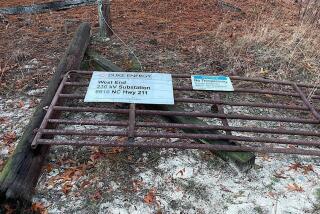Southerners Need True Grits in Maine
- Share via
DENMARK, Maine — When a team of utility workers from North Carolina’s Great Smoky Mountains got a call to help restore power to thousands of shivering folks in Maine, they figured they knew what to bring.
The crew had a mobile command post loaded with computers, fax machines, radios and even a microwave oven, stove and refrigerator. They also had a fleet of huge trucks, including a tool shop on wheels.
But the 50 or so linemen, many of them veterans of past campaigns like Hurricane Andrew, forgot one important thing: grits.
Yankee restaurants--at least those that managed to stay open after last month’s ice storm knocked out electricity--have yet to recognize the pleasures of ground hominy.
Not long after a wave of Air Force jets dropped off Tom Smitherman and his handpicked team, their head office in Franklin, N.C., had a box of instant grits in the mail.
“As long as we have a guitar and our grits, we’re happy,” said Smitherman, vice president of production at Nantahala Power & Light Co.
Since their arrival nearly two weeks ago, these self-described “outback boys” have gotten an up-close look at a part of the country that hits them with arctic blasts one minute and warm smiles of gratitude the next.
The Southern drawls have not escaped the notice of storm-weary residents of Denmark, a town of about 850 people in rural southwestern Maine. And Smitherman raises eyebrows at the local convenience store when he pours a bag of salted peanuts into his bottle of pop, apparently another Southern custom.
Some Maine traditions strike the men from Dixie as a bit odd as well. Doug Battles took one look at an ice fisherman’s shack on a frozen lake and shook his head.
“We’ve got outhouses in North Carolina too, but you won’t see us putting them out in the middle of a lake,” he joked.
The Jan. 8 storm that cut off electricity to more than 500,000 people in Maine overwhelmed the state’s utilities, forcing them to ask for outside help. Nantahala responded, as did more than a dozen other utilities from as far away as Florida.
Central Maine Power Co., the state’s largest electric utility, said 560 out-of-state line crews were lending a hand at one point. In return, CMP agreed to pay their wages, lodging, food and other expenses.
With the effort winding down, CMP estimated its costs of restoring power at $55 million.
The linemen have pulled 17-hour shifts in extreme cold and eaten their lunches while sitting crowded together in the heated cabs of their trucks. The work is dangerous, grueling and stressful.
Maine outdoor clothing retailer L.L. Bean donated special trousers, coats and long underwear, while thankful residents cooked them meals and even took them into their homes for the night.
A teacher put up a sign in his yard that proclaimed, “Thank God for North Carolina.”
“We didn’t care who they were or where they came from, but they’ve done a great job for us,” said Denmark Fire Chief Kenneth Richardson, who was without power for 11 days.
The North Carolina workers said Maine’s rugged mountains and deep forests reminded them a lot of Franklin, their hometown in southwestern North Carolina and a flooring manufacturing center of about 2,800 residents. But there were some notable differences.
“I just got one thing I don’t like about Maine,” said Battles, bundled up in several layers of clothing. “It takes a long time for the snow to melt. When it snows at home, at least it melts.”
Construction superintendent Dick Wittekind said: “The only thing I’d miss up here is golf. Back home, you can play golf in the winter.”
All said they were impressed at the warmth and kindness shown by the Mainers they’ve met.
Returning the Northern hospitality they have been shown, Smitherman organized a “hoedown” at a school in Bridgton. As Battles strummed a guitar despite fingers badly cracked by the cold, the rest of the North Carolina delegation joined in with a stringed tub, banjos and jew’s-harps while wailing a song he wrote to commemorate their stay, “Ballad of the Ice.”
“We’re going to tear down the Mason-Dixon Line before this is all over!” Smitherman roared. “It’s going to be like the Berlin Wall coming down!”
More to Read
Sign up for Essential California
The most important California stories and recommendations in your inbox every morning.
You may occasionally receive promotional content from the Los Angeles Times.












